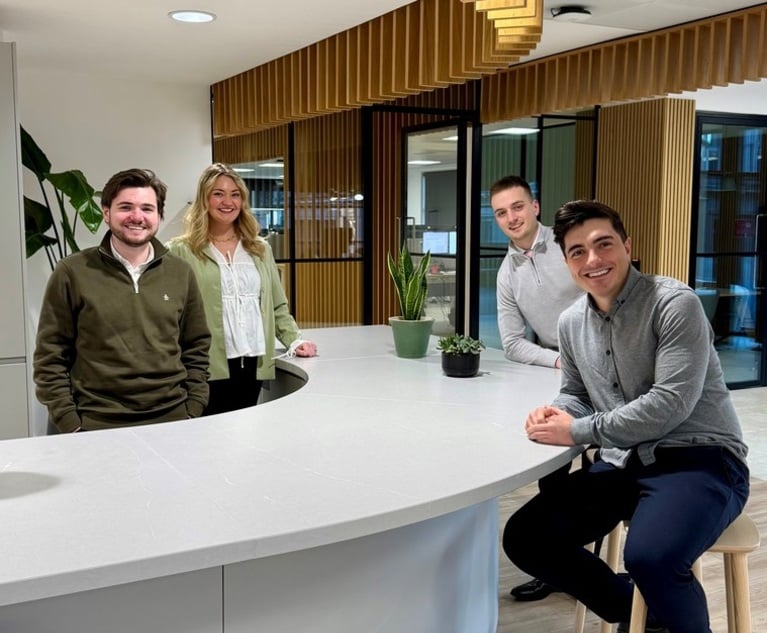The Story of The Trainee Who Defied The Odds to Enter Big Law
'I still feel like someone's going to tap me on the shoulder and say 'what are you doing here?'', says the Hogan Lovells lawyer.
June 10, 2020 at 07:00 AM
7 minute read
 Megan Stewart, Hogan Lovells
Megan Stewart, Hogan Lovells
Growing up, the likelihood of Hogan Lovells trainee Megan Stewart ever working at a top U.K. law firm had been exceptionally small.
When she took her GCSEs at her local comprehensive school near to the tiny Nottinghamshire village where she grew up only 32% of her unusually large year group got a C or above in Maths or English.
Though she knew from a young age that she wanted to be a lawyer, by studying at a school with such a poor reputation and as a would-be first generation university student, Megan's chances of reaching her goal were slim.
With no connections to the industry, and no support forthcoming from the teachers at her comprehensive school, it was left to Megan to pull herself through school.
This came in the form of re-writing her school's teaching syllabus in order to maximise her grades, at which she did such a good job that her younger sister was being taught using Megan's syllabus when she took the same exams a few years later.
And when working on her exams to get into university, Megan changed her entire year's timetable in order to be able to do the lessons she needed to do in order to achieve her dream. She even talked her geography teachers into running an after-school class for people who wanted to get an A or A* grade.
While none of these moves particularly endeared Megan to her classmates or teachers, she says now that she doesn't regret doing what she did. When the final results were given and her classmates achieved higher grades than expected, several expressed how grateful they were to Megan.
The biggest hurdles
But despite having achieved the necessary grades to get onto a law course at Nottingham University, Megan says that the biggest obstacles to her pursuing a career in law were not, at their core, academic. Exposure to the industry, and the personal drive that comes from knowing what you want to do, are both the most important in encouraging young people from disadvantaged backgrounds to apply for a career in the law, she believes.
"Without any sort of exposure to that kind of life, it's really difficult for a person to visualise that career in the future," she says. "You can't even think to yourself, 'this is what my life could look like if I work hard'.
"How on earth can you drum up the drive to work hard at school and take that drive to apply for university? Some people have more supportive families, receive more support at school et cetera, but without having that exposure and seeing what your life could be like in, say, five years' time, you never know what you could be missing. And I think that was the biggest limiting factor for me growing up."
"I still feel like someone's going to tap me on the shoulder and say, 'What are you doing here? This place isn't for you'"
Even something as simple as watching cheesy television programmes about what it was like to be a lawyer helped her to picture herself becoming one, Megan says.
Aged 16, she took part in social mobility foundation The Sutton Trust's Pathways to Law programme, which is aimed at giving young people exposure to the legal industry. Through the scheme, Megan met barristers and solicitors, where she asked everyone how she could become like them one day.
When at Nottingham University, she applied for the Trust's extended social mobility programme focused on getting university students into a career in corporate law, through which she attended open days at top firms, including Hogan Lovells.
It was there that she met one of her mentors, Nicholas Cheffings, former global chairman of the firm and the current chair of PRIME Commitment, which offers work experience at law firms for young people from disadvantaged backgrounds.
"You need to remember that your experience isn't less than other people's — it's just different"
She is now in her second seat at the firm, but Megan says that the experience of entering the profession, when it came, was "incredibly daunting".
"I still feel like someone's going to tap me on the shoulder and say 'What are you doing here? This place isn't for you'". It's a self-confidence thing and I know that everyone has feelings like that, but when you do the LPC and you're around well-educated people from Oxford, you think, 'how am I supposed to compete with these people in my career?'
"But then I realised that I have been competing against these people this whole time, ever since school. You need to remember that your experience isn't less than other people's — it's just different. But you have to really keep telling yourself that and building that self-confidence through your career, and that is something that will take time."
Closing the gap
And having time to realise that a career in law might be for them is not necessarily something that people from lower socio-economic backgrounds have in excess. Megan emphasises the need for law firms to push their recruitment techniques at school-age children.
"Law firms are really trying to do a good job, but they're mostly just trying to recruit from a wider range from universities. All I can think is, how many people are you missing out on reaching by the time they get to university?"
"All I can think is, how many people are you missing out on reaching by the time they get to university?"
Talking about her year group's GCSE grades, Megan says that she's not surprised that so many people with a similar background to hers lose sight of their goals. "When you're up against statistics like that, it's hardly surprising. When I think about the people who didn't 'succeed', at least in the most stereotypical way, it is not because of their lack of ability — it's lack of vision, because there wasn't anyone there telling them that they can do whatever they want to do."
Geography is another huge challenge for the industry to overcome. Sending associates to talk to children at a school in London is something that, while a valuable contribution, does not require a particularly large amount of effort from law firms with a huge footprint in the city. Plus, Megan says, just being in the capital and seeing high-flying types walking around helps young people living there to envisage that kind of future for themselves.
For young people living outside of the London bubble, and particularly those living in rural areas, things are different. Law firms are loathe to trek up to under-performing schools just to do a short assembly with disengaged children.
But Megan says that these things "can be really invaluable in the long-term" and will have a profound effect on improving the diversity of the industry — something that law firm clients have been pushing for in more recent years. "Law firms," she says, "need to get on board with that."
Read more
Magic Circle Partnerships' Oxbridge and Private School Bias Exposed
Industry is 'Elitist' and 'a Bit of a Bubble', Say London Lawyers
Law Firms Make Up Third of Social Mobility Index as Baker McKenzie Takes Crown
Have a few minutes to spare? Take the Legal Week job satisfaction survey and tell us your thoughts on working life at your firm.
Click here to take the questionnaire and enter the prize draw, all submissions are strictly anonymous.
This content has been archived. It is available through our partners, LexisNexis® and Bloomberg Law.
To view this content, please continue to their sites.
Not a Lexis Subscriber?
Subscribe Now
Not a Bloomberg Law Subscriber?
Subscribe Now
NOT FOR REPRINT
© 2025 ALM Global, LLC, All Rights Reserved. Request academic re-use from www.copyright.com. All other uses, submit a request to [email protected]. For more information visit Asset & Logo Licensing.
You Might Like
View All

The Merricks-Mastercard Fallout: ‘Defendants Will Be Rubbing Their Hands with Glee’

‘Raises More Questions Than Answers’: Partners Puzzled by Leadership Change at UK Competition Regulator

Law Firms Mentioned
Trending Stories
- 1States Accuse Trump of Thwarting Court's Funding Restoration Order
- 2Microsoft Becomes Latest Tech Company to Face Claims of Stealing Marketing Commissions From Influencers
- 3Coral Gables Attorney Busted for Stalking Lawyer
- 4Trump's DOJ Delays Releasing Jan. 6 FBI Agents List Under Consent Order
- 5Securities Report Says That 2024 Settlements Passed a Total of $5.2B
Who Got The Work
J. Brugh Lower of Gibbons has entered an appearance for industrial equipment supplier Devco Corporation in a pending trademark infringement lawsuit. The suit, accusing the defendant of selling knock-off Graco products, was filed Dec. 18 in New Jersey District Court by Rivkin Radler on behalf of Graco Inc. and Graco Minnesota. The case, assigned to U.S. District Judge Zahid N. Quraishi, is 3:24-cv-11294, Graco Inc. et al v. Devco Corporation.
Who Got The Work
Rebecca Maller-Stein and Kent A. Yalowitz of Arnold & Porter Kaye Scholer have entered their appearances for Hanaco Venture Capital and its executives, Lior Prosor and David Frankel, in a pending securities lawsuit. The action, filed on Dec. 24 in New York Southern District Court by Zell, Aron & Co. on behalf of Goldeneye Advisors, accuses the defendants of negligently and fraudulently managing the plaintiff's $1 million investment. The case, assigned to U.S. District Judge Vernon S. Broderick, is 1:24-cv-09918, Goldeneye Advisors, LLC v. Hanaco Venture Capital, Ltd. et al.
Who Got The Work
Attorneys from A&O Shearman has stepped in as defense counsel for Toronto-Dominion Bank and other defendants in a pending securities class action. The suit, filed Dec. 11 in New York Southern District Court by Bleichmar Fonti & Auld, accuses the defendants of concealing the bank's 'pervasive' deficiencies in regards to its compliance with the Bank Secrecy Act and the quality of its anti-money laundering controls. The case, assigned to U.S. District Judge Arun Subramanian, is 1:24-cv-09445, Gonzalez v. The Toronto-Dominion Bank et al.
Who Got The Work
Crown Castle International, a Pennsylvania company providing shared communications infrastructure, has turned to Luke D. Wolf of Gordon Rees Scully Mansukhani to fend off a pending breach-of-contract lawsuit. The court action, filed Nov. 25 in Michigan Eastern District Court by Hooper Hathaway PC on behalf of The Town Residences LLC, accuses Crown Castle of failing to transfer approximately $30,000 in utility payments from T-Mobile in breach of a roof-top lease and assignment agreement. The case, assigned to U.S. District Judge Susan K. Declercq, is 2:24-cv-13131, The Town Residences LLC v. T-Mobile US, Inc. et al.
Who Got The Work
Wilfred P. Coronato and Daniel M. Schwartz of McCarter & English have stepped in as defense counsel to Electrolux Home Products Inc. in a pending product liability lawsuit. The court action, filed Nov. 26 in New York Eastern District Court by Poulos Lopiccolo PC and Nagel Rice LLP on behalf of David Stern, alleges that the defendant's refrigerators’ drawers and shelving repeatedly break and fall apart within months after purchase. The case, assigned to U.S. District Judge Joan M. Azrack, is 2:24-cv-08204, Stern v. Electrolux Home Products, Inc.
Featured Firms
Law Offices of Gary Martin Hays & Associates, P.C.
(470) 294-1674
Law Offices of Mark E. Salomone
(857) 444-6468
Smith & Hassler
(713) 739-1250








